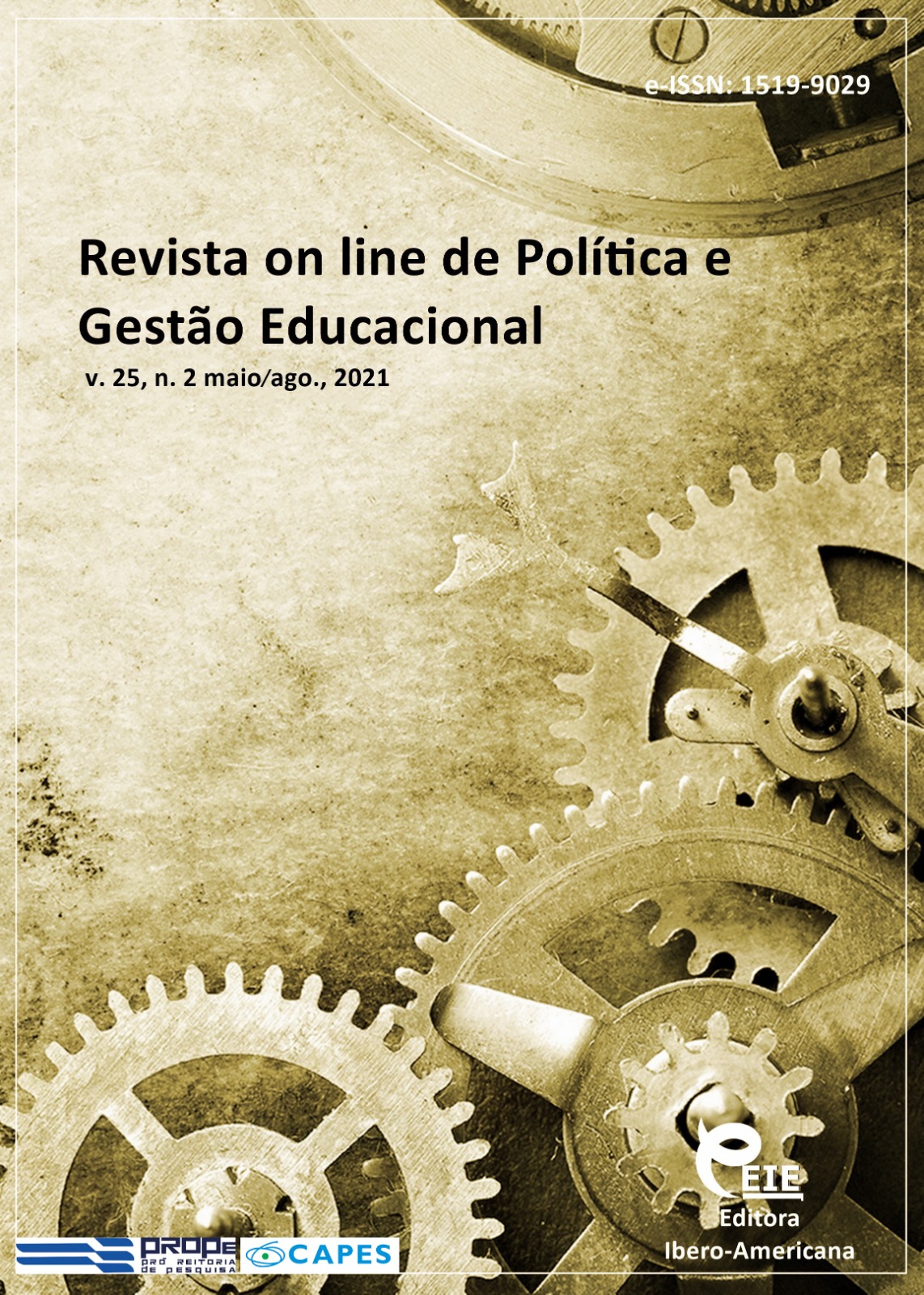Cultura escolar e sua relação com o saber matemático: os sentidos da docência revelados nos cadernos de anotações de uma professora primária
DOI:
https://doi.org/10.22633/rpge.v25i2.15157Palavras-chave:
História da educação matemática, Cadernos escolares, Cultura escolarResumo
Nesse artigo são analisados aspectos da memória educativa, cultural e social do sertão nordestino brasileiro, tendo como fonte de pesquisa os cadernos de anotações de professores primários para compreender o ensino de matemática desenvolvido nos anos iniciais do ensino fundamental no período compreendido entre 1950 e 1990. Os cadernos escolares permitem produzir conhecimentos por conter histórias, contextos socioeconômicos, políticos, culturais e educacionais gestados em temporalidades diversas. O objetivo deste estudo é identificar os conteúdos abordados na escola e aspectos relacionados aos saberes elementares de matemática. Como referências teóricas foram adotadas a concepção de cultura escolar defendida por Viñao Frago (2008) e o conceito de relação com o saber de Bernard Charlot (2000; 1996) que traz a noção de relação entendida como conjunto de significados e espaço de atividades do sujeito, inscritos num tempo. Adotando como referencial teórico-metodológico a História Cultural a partir das proposições de Roger Chartier (1990) e considerando as pesquisas no âmbito da história das disciplinas escolares, empreendidas por André Chervel (1990), o texto ainda considera o paradigma indiciário, de Carlo Ginzburg (1989), na busca da representação do passado e do presente da educação matemática na formação de professores.
Downloads
Referências
CHARLOT, B. Da relação com o saber: elementos para uma teoria. Porto Alegre, RS: Editora Artmed, 2000.
CHARLOT, B. Relação com o saber e com a escola entre estudantes de periferia. Cadernos de Pesquisa, São Paulo, n. 97, p. 47-63, 1996.
CHARTIER, A. Práticas de leitura e escrita: história e atualidade. Belo Horizonte, MG: Ceale/Autêntica, 2007.
CHARTIER, R. A história cultural: entre práticas e representações. Lisboa, Portugal: Editora Difel; Rio de Janeiro, RS: Editora Bertrand Brasil S. A., 1990.
CHERVEL, A. História das disciplinas escolares: reflexões sobre um campo de pesquisa. Teoria & Educação, 2, p. 177-229, 1990.
CORDOVA, T. Redações, cartas e composições livres: o caderno escolar como objeto da cultura material da escola (Lages/SC - 1935). História da Educação, Porto Alegre (RS), v. 20, n. 49, maio/ago. 2016. p. 209-226. Disponível em: http://www.scielo.br/pdf/heduc/v20n49/2236-3459-heduc20-49-00209.pdf. Acesso em: 2 set. 2019.
CUNHA, M. T. S.; SOUZA, F. F. Viver e escrever: cadernos e escritas ordinárias de um professor catarinense (Sec XX). Florianópolis, SC: Insular, 2015.
FERNANDES, R. Um marco no território da criança: o caderno escolar. In: Mignot, A. C. V. (Org). Cadernos à vista: escola, memória e cultura escrita. Rio de Janeiro, RJ: EdUERJ, 2008. p. 49-68.
GINZBURG, C. Mitos, emblemas e sinais. Morfologia e história. São Paulo, SP: Companhia das Letras, 1989.
MENDES, I. A. Investigação histórica no ensino da matemática. Rio de Janeiro, RJ: Ed. Ciência Moderna, 2009.
MENESES, U. T. Bezerra de. Memória e cultura material: documentos pessoais no espaço público. Estudos Históricos. v. 21, p. 89-103, 1998. Disponível em: http://bibliotecadigital.fgv.br/ojs/index.php/reh/article/view%20File/2067/1206. Acesso em: 05 ago. 2019.
MOGARRO, M. J. Cultura material e modernização pedagógica em Portugal (séculos XIX – XX). Educatio Siglo XXI, v. 28, n. 2, p. 89-114, 2010. Disponível em: http://repositorio.ul.pt/bitstream/10451/12308/1/Cultura_Material_e_moderniza%C3%A7%C 3%A3o_pedag%C3%B3gica.pdf. Acesso em: 5 set. 2019.
MOGARRO, M. J. Os arquivos escolares nas instituições educativas portuguesas. Preservar a informação, construir a memória. Pro-Posições, Campinas (SP), v. 16, n. 1, jan./abr. 2005.
VALENTE, V. R. Livro didático e educação matemática: uma história inseparável. Zetetiké, São Paulo (SP), v. 16, n. 30, jul./dez. 2008.
VALENTE, W. R. (Org.). História da educação matemática. Problemáticas de pesquisa, fontes, referências teórico-metodológicas e históricas elaboradas. São Paulo, SP: LFEditorial, 2014.
VALENTE, W. R. A matemática moderna nas escolas do Brasil: um tema para estudos históricos comparativos. Revista Diálogo Educacional, Curitiba (PR), v. 6, n. 18, p. 19-34, maio/ago. 2006.
VIDAL, D. G.; FARIA FILHO, L. M. Reescrevendo a história do ensino primário: o centenário da lei de 1827 e as reformas de Francisco Campos de Fernando de Azevedo. In: VIDAL, D. G.; FARIA FILHO, L. M. As lentes da história. Campinas, SP: Autores Associados, 2005. p. 7-39.
VIÑAO FRAGO, A. Os cadernos escolares como fonte histórica: aspectos metodológicos e historiográficos. In: MIGNOT, A. C. V. (Org.). Cadernos à vista: escola, memória e cultura escrita. Rio de Janeiro, RJ: EdUERJ, 2008. p. 15-28.
Downloads
Publicado
Como Citar
Edição
Seção
Licença
Copyright (c) 2021 Revista on line de Política e Gestão Educacional

Este trabalho está licenciado sob uma licença Creative Commons Attribution-NonCommercial-ShareAlike 4.0 International License.
Manuscritos aceitos e publicados são de propriedade da Revista on line de Política e Gestão Educacional. É vedada a submissão integral ou parcial do manuscrito a qualquer outro periódico. A responsabilidade do conteúdo dos artigos é exclusiva dos autores. É vedada a tradução para outro idioma sem a autorização escrita do Editor ouvida a Comissão Editorial Científica.











